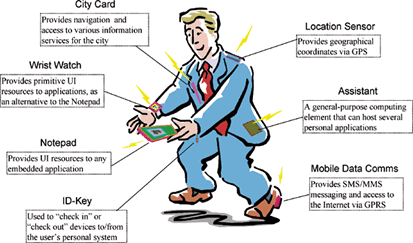February 04, 2003
Cooperative Devices
Along the lines of a multitude of applications, we're also headed for a world of multiple devices that can cooperate with each other. Our challenge over the next few years will be designing these applications so they can be used to multiply each other's value through combination, even as they run in a number of different places and devices.
It's not just the small screens that will be the challenge. It's the model of mobile, occasionally connected devices running a variety of operating systems, talking to each other through standard protocols. How will they communicate? How will they share data? How well will they work offline as well as online?
There's a great article from ECRIM (European Research Consortium for Informatics and Mathematics, also now European host of the W3C). Things like this make me want to move to Europe!
Comments
Nick Crossland says:
Diseņo web says:
We are suffering just a "trend" about inter-relationship between components and devices. Too many unconnected developments in too many different fields to get just one "serius" model to take into account
buscadores says:
This process improvement has already started, when your staff upgraded from land-line phones to pagers, then to cell phones, gaining efficiency at each step. The ability to manage databases, servers, routers and firewalls remotely over a wireless PDA is the inevitable culmination of this sequence. It reduces the cost and risk of enterprise management. This is a major process improvement for both urgent and routine tasks. And it is the only cost-effective way to put someone with the right skill everywhere a systems issue might arise in a distributed enterprise.
Comments on this entry are now closed
You can of course make comments in your own blog, and Trackback continues to be available to reference your post here.


Txtbux is recently launched example of this kind of service. It allows users to check Amazon book prices by sending a SMS text message containing an ISBN from their mobile phone. The book's price, availability and postage are checked online, a text message is sent back to the user's phone, an e-mail is sent containing a link to buy the book, and a list of recently checked books is available next time the user logs onto the web site. The site uses web APIs to communicate between the 4 different servers required to make this service work.